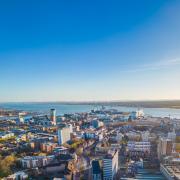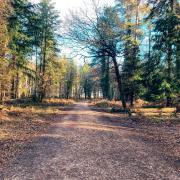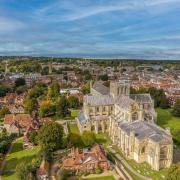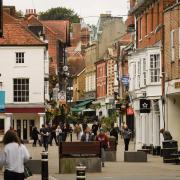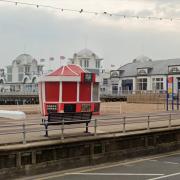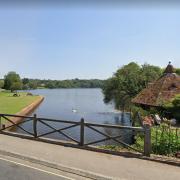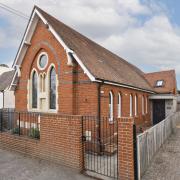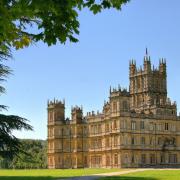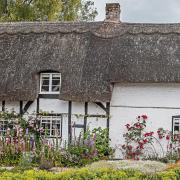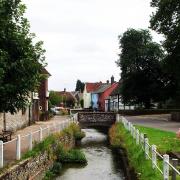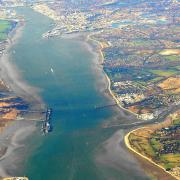The famous Journalist and writer William Cobbett once said that Botley had everything in it that he loved and nothing that he hated. Liz Barnett delves into the history books to find out about life in such a much loved village
Situated on the upper reaches of the Hamble, Botley is a small but perfectly formed village derived from a Roman settlement between Chichester and Bitterne. Due to its position on the river, Botley was historically used as a stop off point for travellers waiting for low tide and there are a great number of pubs and ale houses recorded compared to other areas within Hampshire. Much of Botley has remained as it was and, although no longer accessible from the water, the village still has a great sense of community about it. Jan and Peter Blogg are owners of The Penny Farthing Gallery on the village square which has been in business since 1978. Although officially opened as a framers, over the years Peter and Jan have become increasingly fascinated with the area and the gallery now stocks local history books and supports rising Hampshire artists. Peter says: “Botley predominately still is an area of commuter people, the square is the centre of life in the village and it is a real pleasure to be able to get to know the people that live here through our store, and also the people passing through or tourists that are here for the day.” Other businesses within the square and surrounding streets include French themed caf� Delicieux, arts and crafts shop Between Dreams and local butchers Lewrys, all of which make up the perfect local shopping experience.
Business as usual Throughout its history Botley has adapted its trade depending on the resources available. Looking back, perhaps the two most noteworthy periods of business surround that of the mill and the vast amount of strawberry fields that once encircled the village. Botley flour mill was built in the 11th century and originally barges would have made their way up the river Hamble with coal for the burners, returning (much to the horror I assume of many health and safety officials nowadays) with the fresh flour ready to be distributed across the county. The mill was operated right up to the 1980’s when work was transferred to a site in Hedge End and is now in the process of being renovated with the intention of becoming a museum. During the mid 19th century the climate in Hampshire was such that it became ideal conditions for strawberry growing and quickly became the largest growing area in Europe. By the 1930’s Botley boasted over 36 different commercial growers who relied on the railway to distribute their goods across the country. When the line was built from London to Southampton in the 1840’s there was already a proposed stop off within the Botley region to link the line to Fareham and Gosport and this proved vital to the village as a means to transport goods and to bring people to the area. Strawberry growing was a risky business for a market that was only really around for six to seven weeks within the year and growers had to battle frosts, disease and insects to ensure that they made enough money within those weeks to feed their families for the rest of the year. After the Second World War, competition from Italy and Spain became too great for the Botley growers and many businesses folded. Today, very few strawberry fields remain in the area, a far cry from the scenes that would have been over 60 years ago.
A man of the peopleWilliam Cobbett, perhaps the most famous of Botley’s exports, was actually born in Farnham but moved to Botley in 1805 to raise his brood of seven children and combine his work as a political journalist, with the more demanding role of running a farm and a family. Being the son of a farmer, he was passionate about protecting the trade and rallied against corrupt statesmen and the middle classes resulting in him serving a prison sentence in 1810 for protesting against the use of flogging within the army. This sentence was served in the notoriously violent ‘Newgate Prison’ in London and with disease killing many of the inmates before their executions; it was incredible that Cobbett managed to survive at all. Local historian Dennis Stokes has lived in Botley for around 48 years after originally moving to the area with work and since his retirement, has spent a great deal of time researching the history of the village becoming now somewhat of an expert on the people that lived there and the events that took place. Talking about Cobbett’s return to the village, Dennis says: “There’s quite a tale behind William Cobbett’s return to Botley; All the way down from London, because he was the champion of the workers, they all applauded him and celebrated as he went through. But when he got to Botley, even though the villagers wanted to ring the bells in welcome, the parson at the time, Richard Baker, who didn’t like Cobbett, wouldn’t let them have the keys and so the church bells were never rung.” The story goes that originally, Richard Baker and Cobbett were good friends, but over time, the pair grew to dislike each other possibly because of their similar natures, and a great feud began. Baker is often mentioned in Cobbett’s Rural Rides and one particular exert reads of a time when Cobbett played an elaborate hoax on the parson by tricking him into travelling to a London hotel. He was kept there for several days by friends of Cobbett’s posing as church applicants and when he returned, he found that Cobbett had plastered the village in papers telling of the parson’s adventure and offering a �500 reward to find the hoaxers, a sarcastic gesture that I am sure would have left the parson more than a little red-faced. Cobbett left Botley in 1820 to seek a parliamentary seat and died not long after, today, a memorial can be seen in the square after it was erected by The Institure of Journalists in 1957.
While you’re there
Manor Farm is a fantastic day out for all of the family, set in 400 acres of scenic farmland; visitors can experience what life would have been like working on a Victorian farm. Prices start from �4 for children, family concessions are available. For more information tel. 01489 787055.
Wickham Vineyard is open to the public throughout the year and is a great place to visit. You can follow the wine making process right through from the vineyard to the winery and with top chef Atul Kochhar’s restaurant Vatika on site, it’s the perfect place for a special occasion. Tel. 01329 834042 to book a table.
Botley Mills is in the process of being restored but is still well worth a visit if not to look around the exterior and visit some of the independent stores that have opened up in and around the out buildings. In September, the Mills are open to the public as part of the Heritage Open Days scheme. Tel. 01489 782202.
Getting thereBotley is on the A334 just a few miles from junction 7 of the M27. You could also head cross country from the north of the county leaving the M3 at junction 11 and go south through Twyford and Fair Oak. The sat nav postcode for the square is SO30 2EA.



